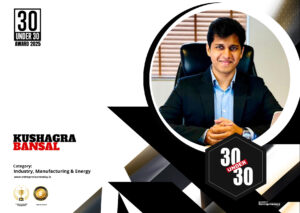
“Focus on solving real problems, not just creating products. Stay resilient through the setbacks, because they teach you more than success ever will. And most importantly, build with long-term impact in mind, profit will follow when your purpose is clear and your execution is strong.”
The 30 Under 30 recipient, Kushagra Bansal, is the Managing Director of KS Spinning Mills and a next-generation leader in India’s sustainable textile revolution.
With a vision to change the future of fashion and home textiles through innovation and circularity, he strongly believes that post-industrial waste can become tomorrow’s high-performance yarn.
Founded in 2022, KS Spinning Mills builds on a family legacy of over four decades in textile expertise. Today, the company stands among the fastest-growing recycled yarn producers in the country, known for transforming post-industrial cotton waste into premium recycled fibers and open-end yarns from count Ne 1 to Ne 40.
The mill operates a closed-loop production model that eliminates dyeing and wet processes and saves millions of litres of water every year. With advanced European machinery and sustainable cotton blended with recycled polyester, the team delivers quality yarns for leading global fashion and home textile brands.
A Forbes India DGEMS honouree, Kushagra is recognised for his impact on a fully circular textile economy. Reflecting on what inspired him down this road, he says,
“I was deeply aware of both the potential and the environmental challenges of the textile industry. What inspired me was a clear gap and the need for scalable, sustainable alternatives to traditional yarn production. Backed by our group’s existing infrastructure and technical expertise, we built a state-of-the-art facility focused on circularity from day one, combining innovation, efficiency, and responsibility to meet the demands of a more conscious global market.”
A Competitive Edge
KS Spinning Mills’ USP lies in its commitment to building a fully circular, future-ready textile ecosystem.
While many players in the recycled yarn space treat eco-conscious practices as an add-on, KS Spinning Mills has built its entire operation around 100% recycled fibers and open-end yarns. With advanced European machinery, the company ensures consistency, scalability, and performance across every count and blend. He further reveals,
“Our process avoids dyeing and wet processing altogether, helping us save millions of liters of water annually, a critical differentiator in an industry known for high water consumption. Moreover, our vertical integration, technical expertise, and ability to customise blends for diverse global applications make us a preferred partner for brands looking for high-performance, eco-conscious solutions.”
Navigating Challenges
There were several roadblocks along the way for KS Spinning Mills, including perception, infrastructure, and supply chain barriers.
One of the initial challenges was shifting industry mindsets. Convincing suppliers, partners, and even customers that recycled yarn could match or outperform virgin alternatives took time, patience, and proof. They were only able to build trust with extensive product testing, education, and a willingness to challenge long-held assumptions about quality and durability.
Another initial struggle was scaling up. Creating a high-volume production system without compromising environmental integrity meant having a significant investment in advanced infrastructure. However, they were able to overcome this by adopting advanced European machinery and assembling a team skilled in balancing efficiency with sustainability.
The last complexity was in sourcing. The supply chain for post-industrial textile waste remains fragmented and inconsistent, which is a major obstacle for companies trying to operate at scale. KS Spinning Mills tackled this by building long-term relationships and developing a transparent, traceable sourcing framework.
Future Looks Bright
“We measure success through a balance of environmental impact, customer trust, and scalable growth. For us, it’s not just about volumes, it’s about how efficiently and responsibly we can produce them.”
One of the major accomplishments for KS Spinning Mills is that they have diverted thousands of tonnes of textile waste from landfills by turning post-industrial scraps into high-performance recycled yarns. Moreover, the mill saves millions of litres of water every year by running a closed-loop process that skips dyeing and wet processing
Kushagra also takes pride in the fact that in just a few years, the company has built a global customer base, supplying leading fashion and home textile brands with eco-conscious fibers. He was even named a Forbes India DGEMS honouree for driving innovation and impact in sustainable manufacturing. He was also named among Hindustan Times’ 10 Rising Entrepreneurs in Textile and Apparel and invited to speak on sustainability panels at Apparel Sourcing Week and CMAI.
Despite the accolades he has received, Kushagra reveals,
“Our biggest yardstick of success is seeing sustainability become a core expectation, not an exception, in the textile industry, and knowing we’re actively driving that shift.”
For now, Kushagra’s next immediate goal is to be the world’s leading recycled yarn manufacturer and build a fully circular textile ecosystem from fiber to finished garments. They plan to achieve this by scaling their production, expanding into fabric and garment manufacturing, and investing in R&D to develop innovative, high-performance recycled blends.
Words of Wisdom
Some of the lessons Kushagra has learned over the years are that businesses that are purpose driven take time to build, but create a lasting impact. He also emphasises the need to surround oneself with the right people, as it makes all the difference.
Lastly, as he signs off, Kushagra notes,
“Building something sustainable, both environmentally and commercially, requires patience, adaptability, and a willingness to challenge traditional norms. I’ve also learned that people and partnerships are everything.”







